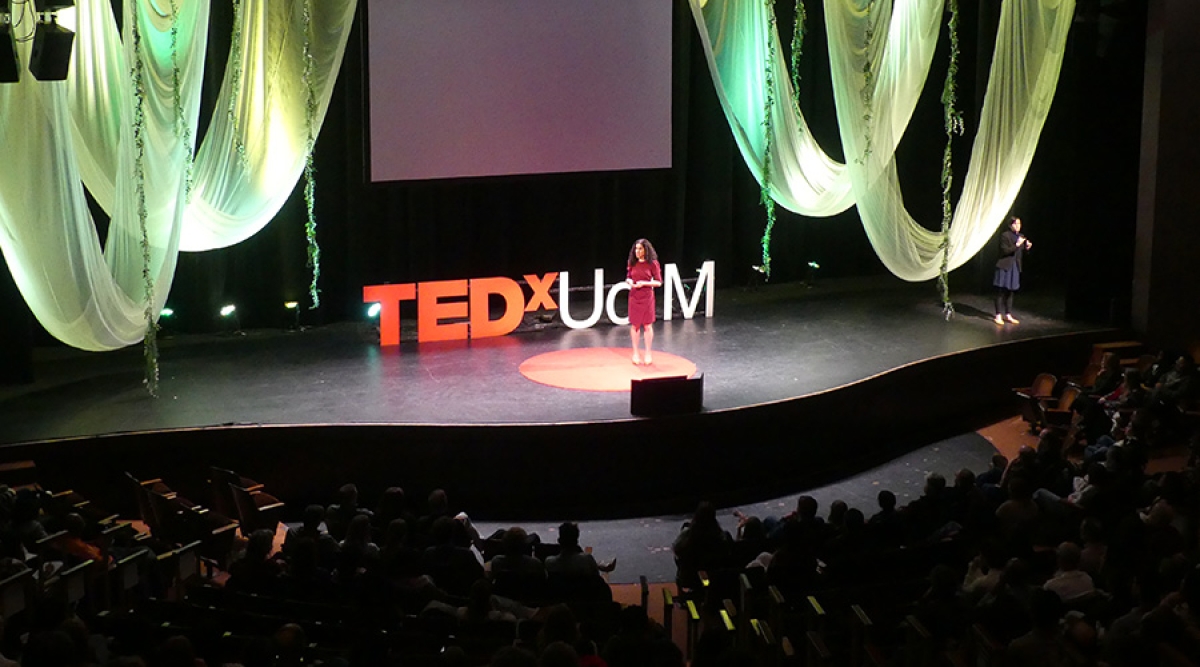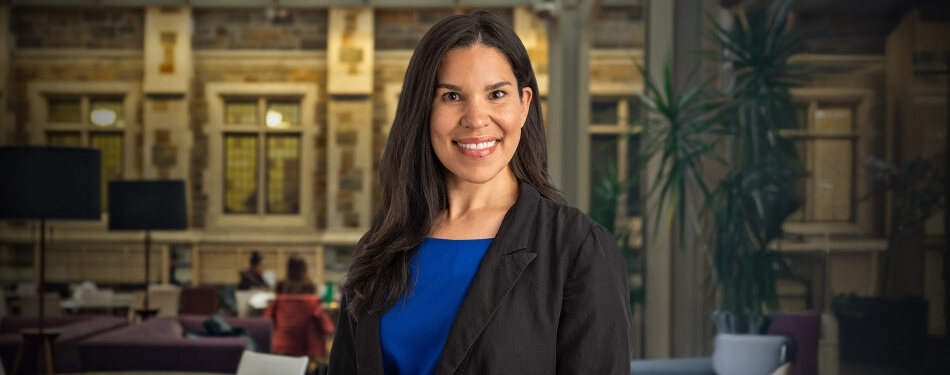When Michigan Law Professor Tifani Sadek was invited to give a talk at TEDxUofM in March, she knew she wanted to speak about the “stages of competence,” a process of moving from incompetence to competence in a skill set. The process had served her well as the co-director of the Entrepreneurship Clinic and the Law and Mobility Program at Michigan Law.
What she didn’t initially know was how personal the speech would become. The event’s theme, “Rooted,” had speakers draw on their personal histories in their presentations. Sadek’s impoverished childhood was something she had mostly kept in the background, not something she thought she would share with an auditorium full of strangers.
But she came to realize that talking about her personal background was a necessary element of her presentation and served as a framework for the stages of competence.
Included here are quotes from her presentation as well as her thinking behind the whole experience.

“We all have a story. Some chapters we hold close—those moments of joy, triumph, and celebration. But then there are the chapters we’d rather tear out—the ones filled with pain, regret, and struggle, the chapters we wish we could rewrite. For a long time, I wanted to rewrite many of my chapters because the beginning of my story is sad. My childhood is a story of poverty, instability, and chaos. So it’s not lost on me that one of the first times I tell my story out loud is in front of a room full of strangers and countless people online. But that’s the point today.”
–—
Sadek drew on deeply personal stories that she previously had not told many people. But she felt it was necessary to convey the message of growth and learning that she wanted to share with the audience.
She started putting together her talk by researching resilience and reflecting on her own resilience despite the challenges of her childhood. She credits her ability to move beyond the challenges to her mother and the safety and support her mother provided.
“I never felt so fortunate to have that until I started hearing other people’s stories,” she said. “I thought everyone else came from these picture-perfect backgrounds. But, honestly, once you break that wall, you realize everyone has something they’re dealing with. Maybe it’s not the same as I went through, but they’re dealing with their own things.”
She also realizes she was lucky to attend a very good high school that made the assumption that a student as intelligent as Sadek would attend college.
“I just wouldn’t have gone to college had I not gone to a school where the mentality was that ‘you’re just gonna go.’”
–—
“I had mistaken the pain of growth and learning through experience as proof that I wasn’t good enough. I believed my past had set me too far behind, that I was fundamentally too different to ever fully belong to this professional class that I had joined. And, once again, I started letting my discomfort dictate my choices. I shied away from those stretch assignments that could have accelerated my learning. I hesitated to take professional risks, convincing myself I wasn’t ready. I played small in rooms where I had every right to take up space.”
–—
Despite her academic successes and nascent professional career, Sadek still harbored insecurities that resulted in imposter syndrome. She felt out of place in the large law firm where she started her career and shared a story with the TED audience about lunch with one of the firm’s partners that made her feel completely out of her element. Choosing from the menu of entrees that she had never seen before, she ordered squab, hoping “it was some kind of exotic vegetable” and feeling mild shock when the bird appeared on her plate.
While that was just one long-ago lunch, she still harbors some of those feelings and hesitations in her work. For example, years later, she listened to a presentation of research on bankruptcy for delinquent child support. The presenter talked about the psychological aspect of a father getting behind on his child support and how that can pull him away from the family.
“And we’re talking about policy implications of the fact that you can’t declare bankruptcy for child support arrearage,” she said. “And inside my head I’m like, ‘Oh, this is a big deal.’ Growing up, my dad couldn’t hold a steady job because of his mental health issues, and he got behind on his child support, and it affected the relationship. He felt so much shame and didn’t want to come around the family, and I wanted to raise my hand and say that because it was directly on point. But I didn’t.”
Those episodes, however, are now few and far between.
–—
“One day I learned something that changed everything for me. It reframed the way that I experienced discomfort, and it fundamentally reshaped how I handled the fear of stepping into the unknown. It is the reason I’m standing here right now as a professor in one of the best law schools in the world, sharing with you the very story I once tried to hide. It’s most commonly known as the stages of competence, but I personally call it the ‘vicious cycle of learning.’”
–—
Sadek shared with the TED audience the stages of competence that she first learned in a leadership training while working at General Motors, a process that has helped her overcome her imposter syndrome. She outlined the four stages, using the framework of public speaking as an example:
- Stage 1: Unconscious Incompetence or “You don’t know what you don’t know.” In public speaking, this could be someone who has never made a presentation and therefore doesn’t realize how difficult it can be—until they are in front of a group of people and words fail them.
- Stage 2: Conscious Incompetence or “This is hard!” This is what happens when you have experienced the pain of a public speaking failure and try to avoid it at all costs.
- Stage 3: Unconscious competence or “You can do it…kind of.” Having experienced the pain, you resolve to push through and do a better job. The result is more effort, but also growth.
- Stage 4: Unconscious competence or “You got this!” At this stage, a skill has become second nature. Rather than remain stuck in stage 2, Sadek learned that any discomfort was not proof that she wasn’t capable but was a necessary step overcoming her insecurities. At that point, the arc of her career changed and she accepted tougher assignments, asked for promotions, and stepped into leadership roles.
“I was really excited to share the model because I knew it would help other people,” Sadek said.
“Knowing that it was mostly students in attendance, that’s what I was super excited about—to share it with students who are probably in the middle of that cycle and don’t recognize what they’re going through.”
–—
“That’s where I am right now in sharing my story; I’m somewhere between stage 2 and stage 3, telling myself it won’t always be so tough. But it was hard to include my story as a part of this TED talk. …I hope if those things are important to you, that you’ll push through, because mastery isn’t reserved for the naturally gifted, it’s for those willing to endure the cycle.”
–—
Sadek said that, following the talk, she received messages from many students who are facing their own challenges, including an undergraduate student who, throughout his life, was so focused on academics that he hasn’t developed what he considers to be adequate social skills.
“It’s painful to be the socially awkward one in a social encounter. But he knows he’s not going to learn how to be more social until he makes it through the cycle a few times,” Sadek said.
“Another student did come from a picture-perfect background,” she added. “But one of their parents was an alcoholic. And so they were dealing with scary things, too. It was very eye opening to me to not make assumptions that ‘Oh, both your parents were professionals. What a great life you had.’ Maybe they did, but maybe they were dealing with their own hard things.”







